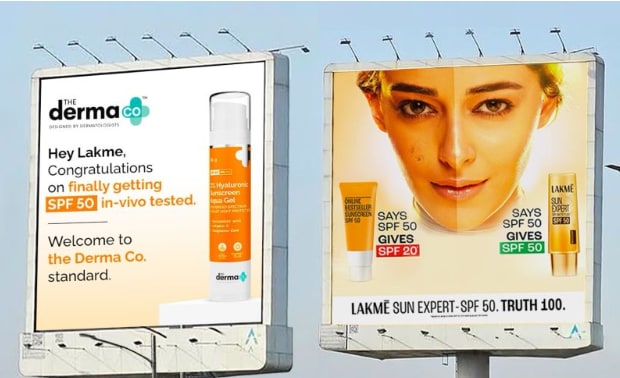A new brand rivalry has emerged under the intense summer spotlight, as Honasa Consumer Ltd., the parent company of Mamaearth, has filed a lawsuit against Hindustan Unilever Ltd. (HUL), accusing the FMCG giant of brand mimicry and demanding the removal of its latest ad campaign. According to sources, the first court hearing is scheduled for Wednesday afternoon.
The dispute centers around a battle between HUL’s Lakmé and Honasa’s Mamaearth over sunscreen effectiveness — and allegations of imitation.
The feud began when Lakmé launched a new marketing campaign for its SPF 50 sunscreen, Lakmé Sun Expert. The campaign introduced a dramatized concept called the “SPF Lie Detector Test,” which suggested that some “online bestsellers” significantly exaggerated their SPF claims. While the ad didn’t explicitly name any brands, it featured two unbranded sunscreen bottles that bore a strong resemblance to products from Mamaearth’s The Derma Co. and Nykaa’s Dot & Key.
Lakmé claimed the ad was based on in vivo testing — a globally recognized gold standard for evaluating sunscreen effectiveness — conducted at an independent, accredited lab. According to the company, while its product met the advertised SPF 50 level, others tested delivered as little as SPF 20.
Read More: Mamaearth-Lakmé faceoff: Skincare brand wars heat up, HUL responds
Mamaearth responded quickly. co-founder Ghazal Alagh took to social media to publicly accuse Lakmé and its parent company, HUL, of copying not only Mamaearth’s sunscreen but also other products, such as its vitamin C face wash and onion shampoo. In a now-deleted post, Alagh shared side-by-side images and launch timelines under the headline “OG vs Copy” to support her claims.
“Indian FMCG has lacked strong competition for a long time,” Alagh wrote in another post that is still online. “We take pride in challenging these norms and repeatedly waking up legacy brands.”
In an exclusive statement to Storyboard18, HUL defended its product and advertising, stating that its sunscreen claims are thoroughly validated. “Since 2015, we’ve conducted in vivo SPF testing across our sun care portfolio,” said an HUL spokesperson. The company also asserted that several popular sunscreen brands have been “falsely claiming SPF 50.”
“In the interest of consumers, independent lab testing has shown that some of these products fall significantly short of their stated SPF levels,” the spokesperson added. “This misleads consumers and poses potential skin risks, including pigmentation, premature aging, and dark spots. Indian consumers deserve access to sunscreens they can trust.”
